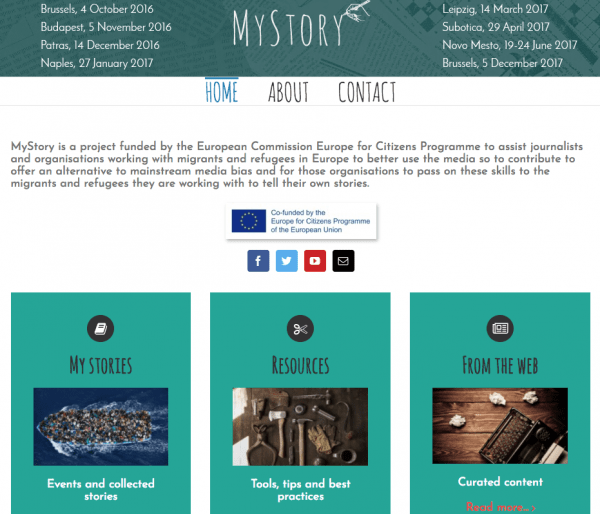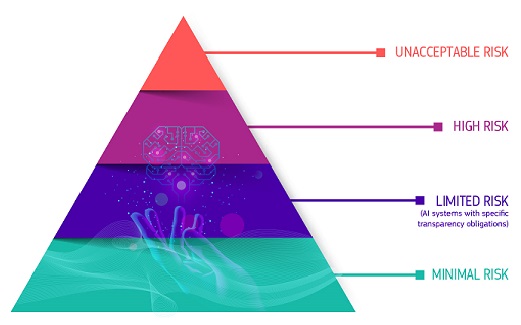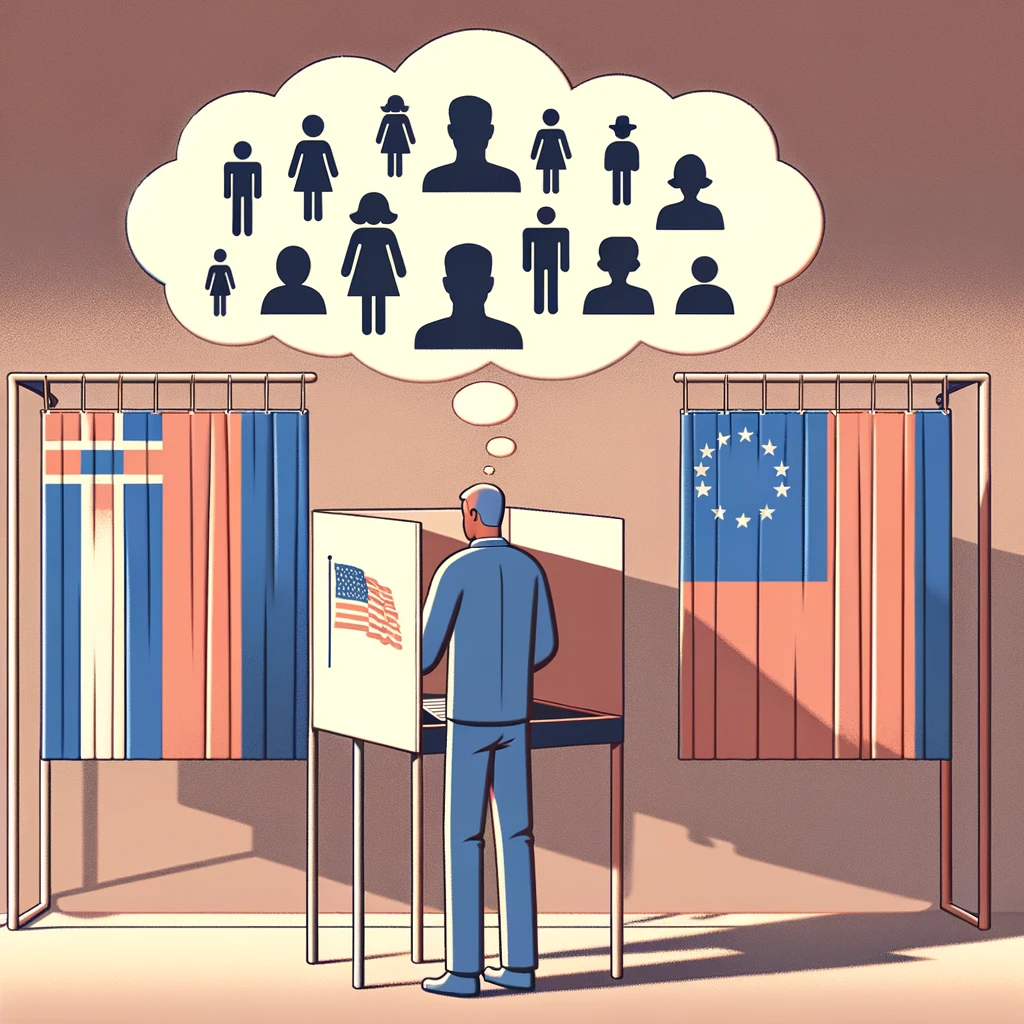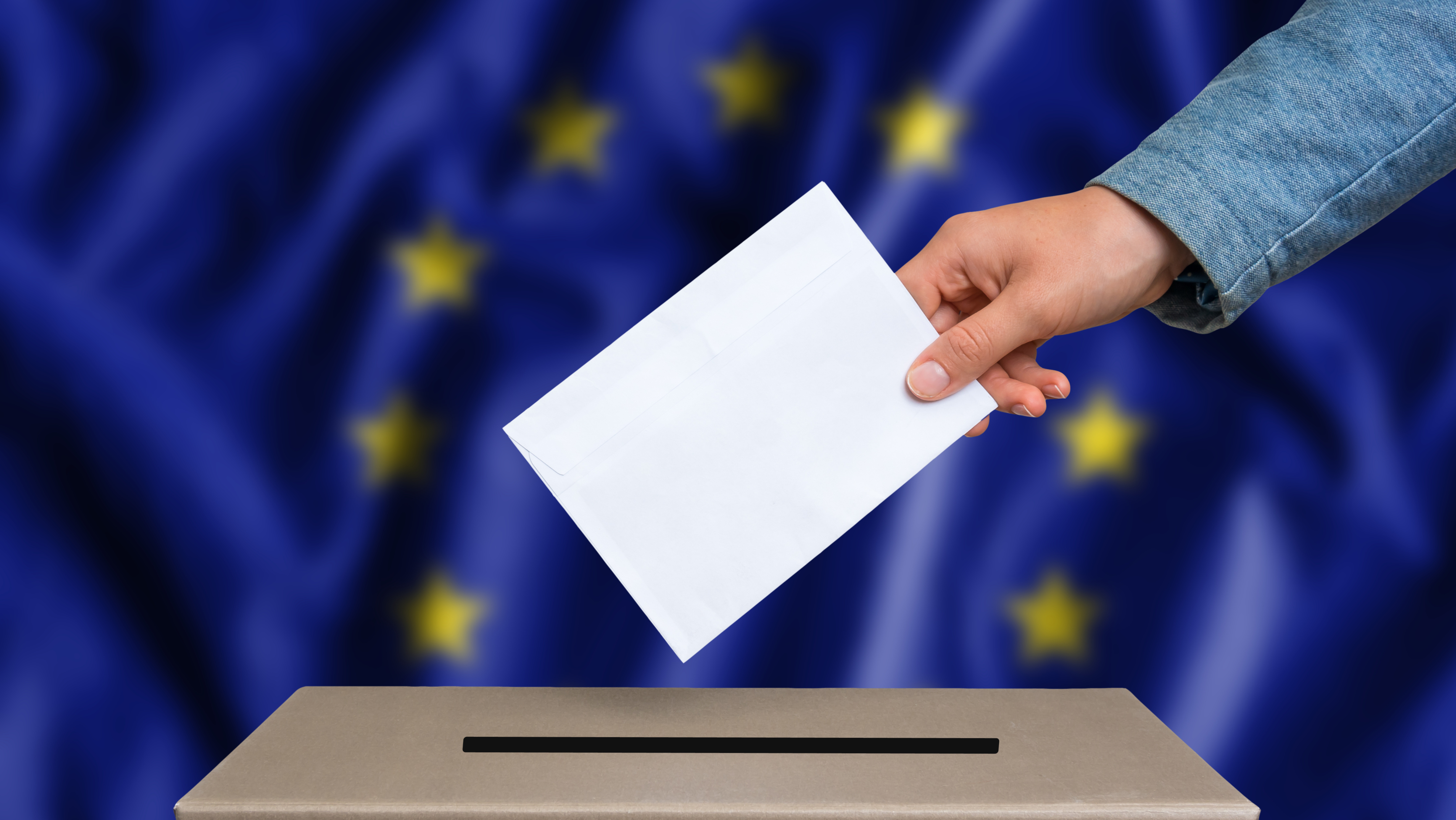The #MyStory: Media, Migrants & Refugees project was an initiative to raise awareness, promote discussion and assist journalists, migrants and refugees and the organisations working with them, to contribute to improve the media narratives of displaced peoples in a fair way.
The project (577396-CITIZ-1-2016-1-BE-CITIZ-CIV) was funded with the support of the European Union under the Programme “Europe for Citizens”
Within the project we organised ten events in seven different countries. Our debates have been very well received including at the highest level at the European Parliament. Many quality videos have been produced and they are available through this website. Here is where we were!
Event 1 – Refugees and Migrants: Brussels (Belgium) on 4/10/2016
‘The inconvenient Truths (Journalism against bias and stereotypes)’
The initial event was filmed and counted as speakers, representatives of European Federation of Journalist, Associazione Carta di Roma, The Charter of Indomeni, Euronews, ANSA, UNHR, UN Refugee Agency, the International Organisation for Migration (IOM) and UNESCO. The event involved 42 participants. There were one or more participants for the following 13 EU countries: Spain, Germany, Belgium, Italy, Greece, Romania, France, Hungary, Ireland, Slovenia, Finland, Portugal, Nederland, plus others from USA, Australia and Turkey. More information http://bit.ly/2BlQXQO
Event 2 – Szeged (Hungary) on 5/11/2016
‘Debate on Media, Stereotypes and Delusive rhetoric’
A debate involving citizens, refugees and journalists to document how individuals’ opinions are shaped by the media and Government. 78 participants, mainly Hungarians. More information http://bit.ly/2DCggTH http://bit.ly/2DwvPt2
Event 3 – Patras (Greece) on 14/11/2016
‘Internet media literacy, migration and the role of online media journalism: Good practices and dangers’.
Mainly Greek participants expressed their views on the migrants’ crisis. Discussions range from the spread of hate speech to the misinformation from media. Participants: 35 including refugees to testimony their experiences.
Event 4 – Naples (Italy) on 27/01/2017
‘Esperienze positive di migranti e rifugiati’.
114 Participants from Italy. At the University of Naples, many different aspects related to migration and media have been debated, Many Refugees were also present. It followed an interactive workshop on story telling where 26 more people also participated. More information http://bit.ly/2DxKV5s
Event 5 – Leipzig (Germany) on 14/03/2017
‘Digital Storytelling as a stimulus to social dialogue’.
The event was very interactive and focused on video literacy and participants (97, manly Germans but also including many refugees) learnt to formulate storytelling and produce low costs videos. More information http://bit.ly/2n75qf1
Event 6 – Subotica (Serbia) on 27/04/2017
‘Media in operation: How personal migrants and refugees’ situations can be translated into media content’
65 mainly Hungarians participants including journalists, discussed about the production of news and how to rethink the coverage of migration. Video interviews were also produced by a BBC reporter. More information http://bit.ly/2Dv3JhG
Event 7 Athens on 15/05/2017 (replacement event)
‘Workshop media literacy, the refugees issue and the role of online journalism’.
Following on the event in Patras, 54 participants, mainly Greeks, had the opportunity to learn about how journalism shape the social discourse. More information http://bit.ly/2E0HPE0
Event 8 – Novo Mesto (Slovenia) on 19-23/06/2017
Within the Week of Cultures to grant a bigger audience, Workshops, talks and activities
To increase awareness about media literacy and migration reporting, mainly aimed at young Slovenian people (119 participants). Diversity and discriminatory practices. More information http://bit.ly/2BoqDW1
Event 9 – Szeged (Hungary) on 21/09/2017 (extra event)
‘Role interpretations of journalists in their reports with refugees’
Given the interest originated by the previous event and documentary, an extra event with 62 Hungarians participants was organised in Hungary. More information http://bit.ly/2rsINGq
Event 10 – Brussels (Belgium) on 5/12/2017
My Story, Media (literacy) and refugees.
56 Participants from 16 EU countries (Germany, France, Spain, Italy, Greece, Belgium, Hungary, Nederland, Slovenia, Finland, UK, Poland, Romania, Lithuania, Slovakia, Croatia) plus more from Switzerland, USA, Australia and many refugees’ countries representatives . More information http://bit.ly/2DGAR9t The morning event continued at the European Parliament to discuss freedom of expression and better representation of refugees in the media. Interventions included MEPs and international organisations. More information http://bit.ly/2BoyXFp
In addition to the (a) events listed above, MyStory also carried out activities in (b) Audiovisual production and (c) compiling a Guide.
(a) EVENTS (See above)
(b) AUDIOVISUALS VIDEOS
It includes about 15 newly produced videos, including two full one-hour documentaries produced by professional film directors. All the audiovisual material produced is now available on the project website and on YouTube channels for free vision. Find a selection below, for the complete list please visit other parts of this website.
http://bit.ly/2DucHMd Interviews at the event in Brussels;
http://bit.ly/2F62A0s A Workshop in Germany;
http://bit.ly/2n1kueg Imprint Media messages, Documentary from Hungary;
http://bit.ly/2ruYNrv Naples, this video was a finalist in the MYART (Mediaterranean Youth) International Film Festival;
http://bit.ly/2Dv3JhG ‘Hoping for the miracle’, a video summary of the event Dissecting Journalism held in Serbia;
http://bit.ly/2G876Nd Summary of a lecture and workshop on the consequences of hate speech, in Slovenia.
(c) GUIDE DO’S & DON’TS
The Guide aims to facilitate journalists work so that they are better able to meet ethical standards when portraying migrants and refugees in the media and; to equip migrants and refugees and respective supporting organisations, to produce their stories more effectively.
Based on our debates, workshops, and online activities, the Guide was presented at the European Parliament and handed over to MEPs to inform also policy recommendations on the ethical conducts of portraying M&R in the media.
Those recommendations drew on MyStory’s debates and the network of contacts from the project consortium during the entire life of the project, and take into account relevant international policy papers on the subject. The Guide is available here http://bit.ly/2E6Y16Q
MyStory was coordinated by the European Association for Viewers Interests in partnership with The Alliance Internationale de Journalistes, Wisamar, Euroform, IntermediaKT, DRPDNM and The Hungarian Moving Image and Media Education Association
The #MyStory: Media, Migrants & Refugees project was an initiative to raise awareness, promote discussion and assist journalists, migrants and refugees and the organisations working with them, to contribute to improve the media narratives of displaced peoples in a fair way.
The project (577396-CITIZ-1-2016-1-BE-CITIZ-CIV) was funded with the support of the European Union under the Programme “Europe for Citizens”
Within the project we organised ten events in seven different countries. Our debates have been very well received including at the highest level at the European Parliament. Many quality videos have been produced and they are available through this website. Here is where we were!
Event 1 – Refugees and Migrants: Brussels (Belgium) on 4/10/2016
‘The inconvenient Truths (Journalism against bias and stereotypes)’
The initial event was filmed and counted as speakers, representatives of European Federation of Journalist, Associazione Carta di Roma, The Charter of Indomeni, Euronews, ANSA, UNHR, UN Refugee Agency, the International Organisation for Migration (IOM) and UNESCO. The event involved 42 participants. There were one or more participants for the following 13 EU countries: Spain, Germany, Belgium, Italy, Greece, Romania, France, Hungary, Ireland, Slovenia, Finland, Portugal, Nederland, plus others from USA, Australia and Turkey. More information http://bit.ly/2BlQXQO
Event 2 – Szeged (Hungary) on 5/11/2016
‘Debate on Media, Stereotypes and Delusive rhetoric’
A debate involving citizens, refugees and journalists to document how individuals’ opinions are shaped by the media and Government. 78 participants, mainly Hungarians. More information http://bit.ly/2DCggTH http://bit.ly/2DwvPt2
Event 3 – Patras (Greece) on 14/11/2016
‘Internet media literacy, migration and the role of online media journalism: Good practices and dangers’.
Mainly Greek participants expressed their views on the migrants’ crisis. Discussions range from the spread of hate speech to the misinformation from media. Participants: 35 including refugees to testimony their experiences.
Event 4 – Naples (Italy) on 27/01/2017
‘Esperienze positive di migranti e rifugiati’.
114 Participants from Italy. At the University of Naples, many different aspects related to migration and media have been debated, Many Refugees were also present. It followed an interactive workshop on story telling where 26 more people also participated. More information http://bit.ly/2DxKV5s
Event 5 – Leipzig (Germany) on 14/03/2017
‘Digital Storytelling as a stimulus to social dialogue’.
The event was very interactive and focused on video literacy and participants (97, manly Germans but also including many refugees) learnt to formulate storytelling and produce low costs videos. More information http://bit.ly/2n75qf1
Event 6 – Subotica (Serbia) on 27/04/2017
‘Media in operation: How personal migrants and refugees’ situations can be translated into media content’
65 mainly Hungarians participants including journalists, discussed about the production of news and how to rethink the coverage of migration. Video interviews were also produced by a BBC reporter. More information http://bit.ly/2Dv3JhG
Event 7 Athens on 15/05/2017 (replacement event)
‘Workshop media literacy, the refugees issue and the role of online journalism’.
Following on the event in Patras, 54 participants, mainly Greeks, had the opportunity to learn about how journalism shape the social discourse. More information http://bit.ly/2E0HPE0
Event 8 – Novo Mesto (Slovenia) on 19-23/06/2017
Within the Week of Cultures to grant a bigger audience, Workshops, talks and activities
To increase awareness about media literacy and migration reporting, mainly aimed at young Slovenian people (119 participants). Diversity and discriminatory practices. More information http://bit.ly/2BoqDW1
Event 9 – Szeged (Hungary) on 21/09/2017 (extra event)
‘Role interpretations of journalists in their reports with refugees’
Given the interest originated by the previous event and documentary, an extra event with 62 Hungarians participants was organised in Hungary. More information http://bit.ly/2rsINGq
Event 10 – Brussels (Belgium) on 5/12/2017
My Story, Media (literacy) and refugees.
56 Participants from 16 EU countries (Germany, France, Spain, Italy, Greece, Belgium, Hungary, Nederland, Slovenia, Finland, UK, Poland, Romania, Lithuania, Slovakia, Croatia) plus more from Switzerland, USA, Australia and many refugees’ countries representatives . More information http://bit.ly/2DGAR9t The morning event continued at the European Parliament to discuss freedom of expression and better representation of refugees in the media. Interventions included MEPs and international organisations. More information http://bit.ly/2BoyXFp
In addition to the (a) events listed above, MyStory also carried out activities in (b) Audiovisual production and (c) compiling a Guide.
(a) EVENTS (See above)
(b) AUDIOVISUALS VIDEOS
It includes about 15 newly produced videos, including two full one-hour documentaries produced by professional film directors. All the audiovisual material produced is now available on the project website and on YouTube channels for free vision. Find a selection below, for the complete list please visit other parts of this website.
http://bit.ly/2DucHMd Interviews at the event in Brussels;
http://bit.ly/2F62A0s A Workshop in Germany;
http://bit.ly/2n1kueg Imprint Media messages, Documentary from Hungary;
http://bit.ly/2ruYNrv Naples, this video was a finalist in the MYART (Mediaterranean Youth) International Film Festival;
http://bit.ly/2Dv3JhG ‘Hoping for the miracle’, a video summary of the event Dissecting Journalism held in Serbia;
http://bit.ly/2G876Nd Summary of a lecture and workshop on the consequences of hate speech, in Slovenia.
(c) GUIDE DO’S & DON’TS
The Guide aims to facilitate journalists work so that they are better able to meet ethical standards when portraying migrants and refugees in the media and; to equip migrants and refugees and respective supporting organisations, to produce their stories more effectively.
Based on our debates, workshops, and online activities, the Guide was presented at the European Parliament and handed over to MEPs to inform also policy recommendations on the ethical conducts of portraying M&R in the media.
Those recommendations drew on MyStory’s debates and the network of contacts from the project consortium during the entire life of the project, and take into account relevant international policy papers on the subject. The Guide is available here http://bit.ly/2E6Y16Q
MyStory was coordinated by the European Association for Viewers Interests in partnership with The Alliance Internationale de Journalistes, Wisamar, Euroform, IntermediaKT, DRPDNM and The Hungarian Moving Image and Media Education Association
The #MyStory: Media, Migrants & Refugees project was an initiative to raise awareness, promote discussion and assist journalists, migrants and refugees and the organisations working with them, to contribute to improve the media narratives of displaced peoples in a fair way.
The project (577396-CITIZ-1-2016-1-BE-CITIZ-CIV) was funded with the support of the European Union under the Programme “Europe for Citizens”
Within the project we organised ten events in seven different countries. Our debates have been very well received including at the highest level at the European Parliament. Many quality videos have been produced and they are available through this website. Here is where we were!
Event 1 – Refugees and Migrants: Brussels (Belgium) on 4/10/2016
‘The inconvenient Truths (Journalism against bias and stereotypes)’
The initial event was filmed and counted as speakers, representatives of European Federation of Journalist, Associazione Carta di Roma, The Charter of Indomeni, Euronews, ANSA, UNHR, UN Refugee Agency, the International Organisation for Migration (IOM) and UNESCO. The event involved 42 participants. There were one or more participants for the following 13 EU countries: Spain, Germany, Belgium, Italy, Greece, Romania, France, Hungary, Ireland, Slovenia, Finland, Portugal, Nederland, plus others from USA, Australia and Turkey. More information http://bit.ly/2BlQXQO
Event 2 – Szeged (Hungary) on 5/11/2016
‘Debate on Media, Stereotypes and Delusive rhetoric’
A debate involving citizens, refugees and journalists to document how individuals’ opinions are shaped by the media and Government. 78 participants, mainly Hungarians. More information http://bit.ly/2DCggTH http://bit.ly/2DwvPt2
Event 3 – Patras (Greece) on 14/11/2016
‘Internet media literacy, migration and the role of online media journalism: Good practices and dangers’.
Mainly Greek participants expressed their views on the migrants’ crisis. Discussions range from the spread of hate speech to the misinformation from media. Participants: 35 including refugees to testimony their experiences.
Event 4 – Naples (Italy) on 27/01/2017
‘Esperienze positive di migranti e rifugiati’.
114 Participants from Italy. At the University of Naples, many different aspects related to migration and media have been debated, Many Refugees were also present. It followed an interactive workshop on story telling where 26 more people also participated. More information http://bit.ly/2DxKV5s
Event 5 – Leipzig (Germany) on 14/03/2017
‘Digital Storytelling as a stimulus to social dialogue’.
The event was very interactive and focused on video literacy and participants (97, manly Germans but also including many refugees) learnt to formulate storytelling and produce low costs videos. More information http://bit.ly/2n75qf1
Event 6 – Subotica (Serbia) on 27/04/2017
‘Media in operation: How personal migrants and refugees’ situations can be translated into media content’
65 mainly Hungarians participants including journalists, discussed about the production of news and how to rethink the coverage of migration. Video interviews were also produced by a BBC reporter. More information http://bit.ly/2Dv3JhG
Event 7 Athens on 15/05/2017 (replacement event)
‘Workshop media literacy, the refugees issue and the role of online journalism’.
Following on the event in Patras, 54 participants, mainly Greeks, had the opportunity to learn about how journalism shape the social discourse. More information http://bit.ly/2E0HPE0
Event 8 – Novo Mesto (Slovenia) on 19-23/06/2017
Within the Week of Cultures to grant a bigger audience, Workshops, talks and activities
To increase awareness about media literacy and migration reporting, mainly aimed at young Slovenian people (119 participants). Diversity and discriminatory practices. More information http://bit.ly/2BoqDW1
Event 9 – Szeged (Hungary) on 21/09/2017 (extra event)
‘Role interpretations of journalists in their reports with refugees’
Given the interest originated by the previous event and documentary, an extra event with 62 Hungarians participants was organised in Hungary. More information http://bit.ly/2rsINGq
Event 10 – Brussels (Belgium) on 5/12/2017
My Story, Media (literacy) and refugees.
56 Participants from 16 EU countries (Germany, France, Spain, Italy, Greece, Belgium, Hungary, Nederland, Slovenia, Finland, UK, Poland, Romania, Lithuania, Slovakia, Croatia) plus more from Switzerland, USA, Australia and many refugees’ countries representatives . More information http://bit.ly/2DGAR9t The morning event continued at the European Parliament to discuss freedom of expression and better representation of refugees in the media. Interventions included MEPs and international organisations. More information http://bit.ly/2BoyXFp
In addition to the (a) events listed above, MyStory also carried out activities in (b) Audiovisual production and (c) compiling a Guide.
(a) EVENTS (See above)
(b) AUDIOVISUALS VIDEOS
It includes about 15 newly produced videos, including two full one-hour documentaries produced by professional film directors. All the audiovisual material produced is now available on the project website and on YouTube channels for free vision. Find a selection below, for the complete list please visit other parts of this website.
http://bit.ly/2DucHMd Interviews at the event in Brussels;
http://bit.ly/2F62A0s A Workshop in Germany;
http://bit.ly/2n1kueg Imprint Media messages, Documentary from Hungary;
http://bit.ly/2ruYNrv Naples, this video was a finalist in the MYART (Mediaterranean Youth) International Film Festival;
http://bit.ly/2Dv3JhG ‘Hoping for the miracle’, a video summary of the event Dissecting Journalism held in Serbia;
http://bit.ly/2G876Nd Summary of a lecture and workshop on the consequences of hate speech, in Slovenia.
(c) GUIDE DO’S & DON’TS
The Guide aims to facilitate journalists work so that they are better able to meet ethical standards when portraying migrants and refugees in the media and; to equip migrants and refugees and respective supporting organisations, to produce their stories more effectively.
Based on our debates, workshops, and online activities, the Guide was presented at the European Parliament and handed over to MEPs to inform also policy recommendations on the ethical conducts of portraying M&R in the media.
Those recommendations drew on MyStory’s debates and the network of contacts from the project consortium during the entire life of the project, and take into account relevant international policy papers on the subject. The Guide is available here http://bit.ly/2E6Y16Q
MyStory was coordinated by the European Association for Viewers Interests in partnership with The Alliance Internationale de Journalistes, Wisamar, Euroform, IntermediaKT, DRPDNM and The Hungarian Moving Image and Media Education Association























































































































































